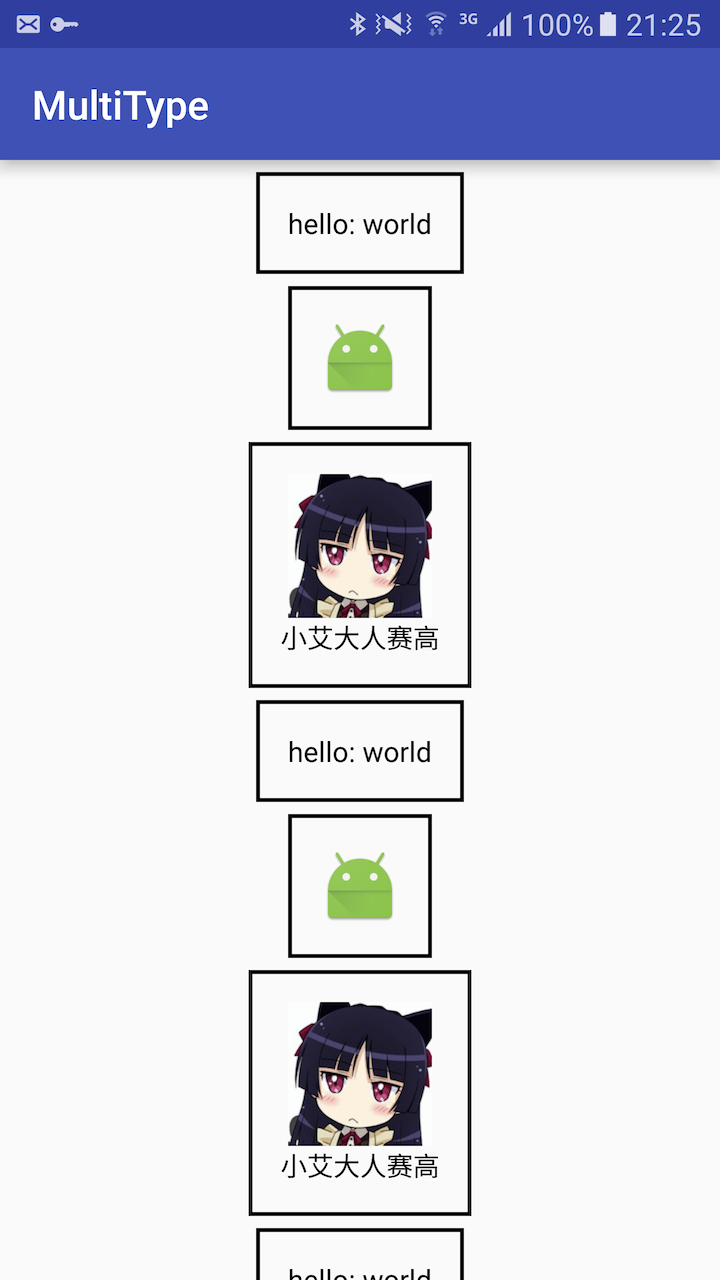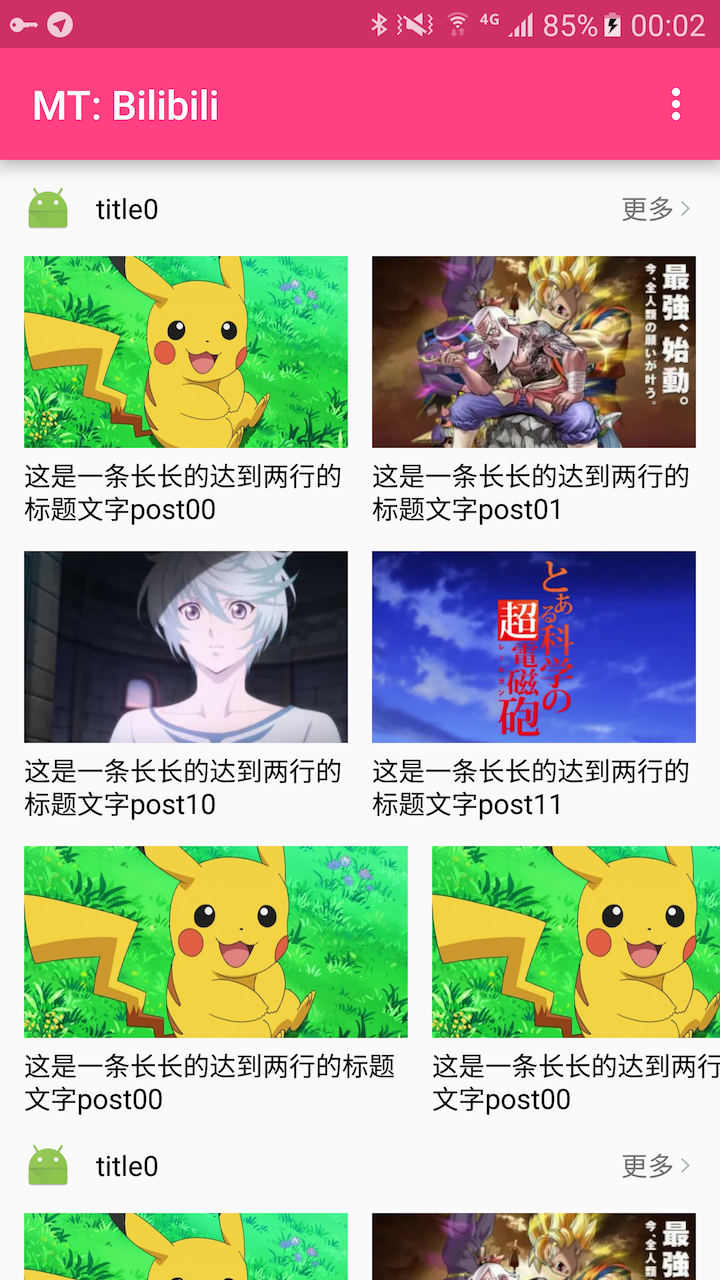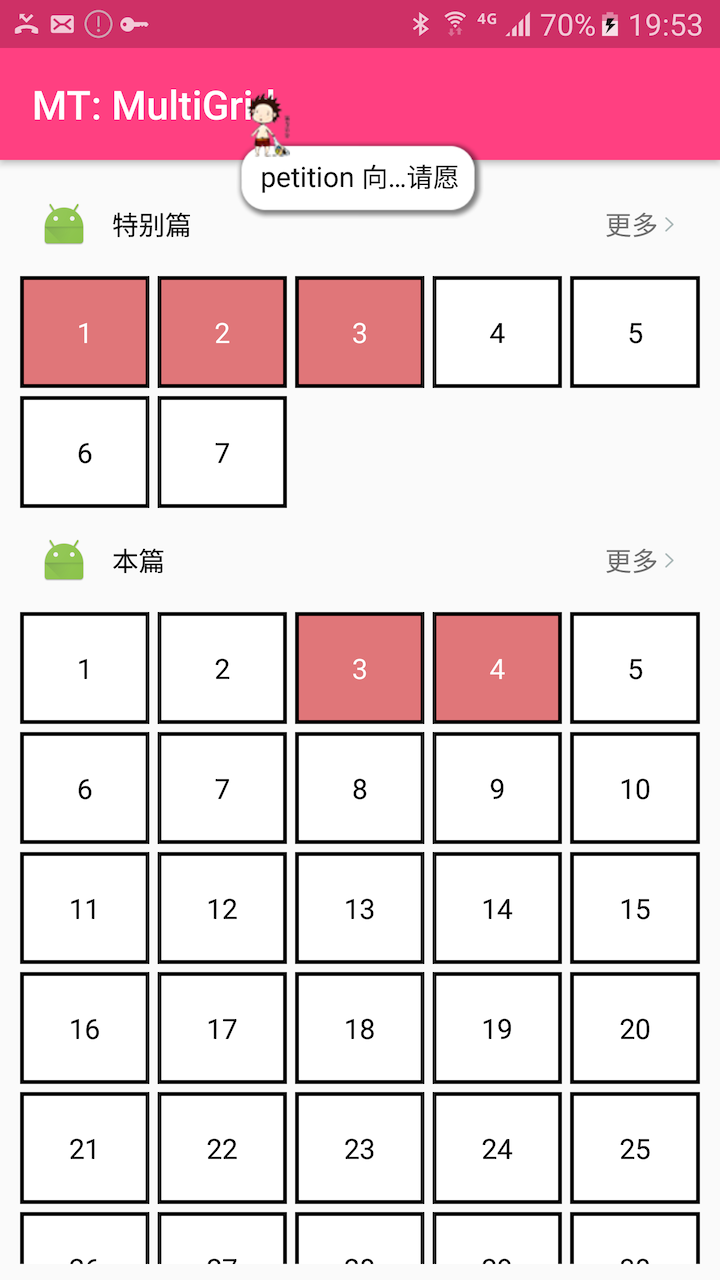MultiType
An Android library to create multiple item types list views easily and flexibly.
English Version | ?Android ?????????? · ????
Previously, when we need to develop a complex RecyclerView / ListView, it is a difficult and troublesome work. We should override the getItemViewType() of RecyclerView.Adapter , add some types, and create some ViewHolders relating to those types. The process is cumbersome.
Once we need to add a new item type, we have to go to the original adapter and modify some old codes, and adapter classes will be bulkier.
Today, I created a new intuitive and flexible way to easily create complex RecyclerViews, with the MultiType library, we could insert a new item type without changing the old adapter codes and make them more readable.
Getting started
In your build.gradle:
dependencies {
implementation 'me.drakeet.multitype:multitype:3.4.0'
}
If you are using com.android.tools.build:gradle:2.+, use this instead:
dependencies {
compile 'me.drakeet.multitype:multitype:3.4.0'
}
Note: MultiType does not support RecyclerView below version 23.0.0.
Usage
Step 1. Create a class, It would be your data model/ Java bean, for example:
public class TextItem {
public @NonNull final String text;
public TextItem(@NonNull String text) {
this.text = text;
}
}
Step 2. Create a class extends ItemViewBinder<T, VH extends ViewHolder>, for example:
public class TextItemViewBinder extends ItemViewBinder<TextItem, TextItemViewBinder.TextHolder> {
static class TextHolder extends RecyclerView.ViewHolder {
private @NonNull final TextView text;
TextHolder(@NonNull View itemView) {
super(itemView);
this.text = (TextView) itemView.findViewById(R.id.text);
}
}
@NonNull @Override
protected TextHolder onCreateViewHolder(@NonNull LayoutInflater inflater, @NonNull ViewGroup parent) {
View root = inflater.inflate(R.layout.item_text, parent, false);
return new TextHolder(root);
}
@Override
protected void onBindViewHolder(@NonNull TextHolder holder, @NonNull TextItem textItem) {
holder.text.setText("hello: " + textItem.text);
Log.d("demo", "position: " + getPosition(holder));
Log.d("demo", "adapter: " + getAdapter());
}
}
Step 3. Just register your types and setup your RecyclerView and List<Object> in your Activity, for example:
public class SampleActivity extends AppCompatActivity {
private MultiTypeAdapter adapter;
private Items items;
@Override
protected void onCreate(Bundle savedInstanceState) {
super.onCreate(savedInstanceState);
setContentView(R.layout.activity_main);
RecyclerView recyclerView = (RecyclerView) findViewById(R.id.list);
adapter = new MultiTypeAdapter();
adapter.register(TextItem.class, new TextItemViewBinder());
adapter.register(ImageItem.class, new ImageItemViewBinder());
adapter.register(RichItem.class, new RichItemViewBinder());
recyclerView.setAdapter(adapter);
/* Mock the data */
TextItem textItem = new TextItem("world");
ImageItem imageItem = new ImageItem(R.mipmap.ic_launcher);
RichItem richItem = new RichItem("??????", R.mipmap.avatar);
items = new Items();
for (int i = 0; i < 20; i++) {
items.add(textItem);
items.add(imageItem);
items.add(richItem);
}
adapter.setItems(items);
adapter.notifyDataSetChanged();
}
}
That's all, you're good to go!
Advanced usage
One to many:
adapter.register(Data.class).to(
new DataType1ViewBinder(),
new DataType2ViewBinder() ).withLinker((position, data) ->
data.type == Data.TYPE_2 ? 1 : 0 );
adapter.register(Data.class).to(
new DataType1ViewBinder(),
new DataType2ViewBinder() ).withClassLinker((position, data) -> {
if (data.type == Data.TYPE_2) {
return DataType2ViewBinder.class;
}
else {
return DataType1ViewBinder.class;
}
}
);
Wiki
Change Log
https://github.com/drakeet/MultiType/releases
Android Studio Plugin
An intellij idea plugin for Android to generate MultiType Item and ItemViewBinder easily.
Sample screenshots
You could check the sample module for more details and after running it will look like:
And it has been used in drakeet/TimeMachine:
License
Copyright 2017 drakeet. Licensed under the Apache License, Version 2.0 (the "License");
you may not use this file except in compliance with the License. You may obtain a copy of the License at
http://www.apache.org/licenses/LICENSE-2.0 Unless required by applicable law or agreed to in writing, software distributed under the License is distributed on an "AS IS" BASIS, WITHOUT WARRANTIES OR CONDITIONS OF ANY KIND, either express or implied. See the License for the specific language governing permissions and limitations under the License. 

